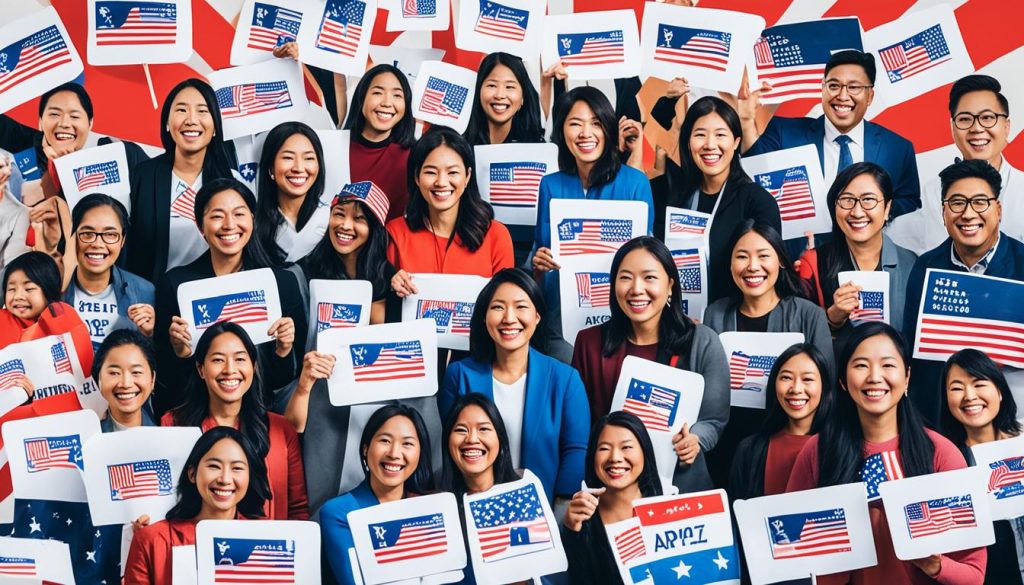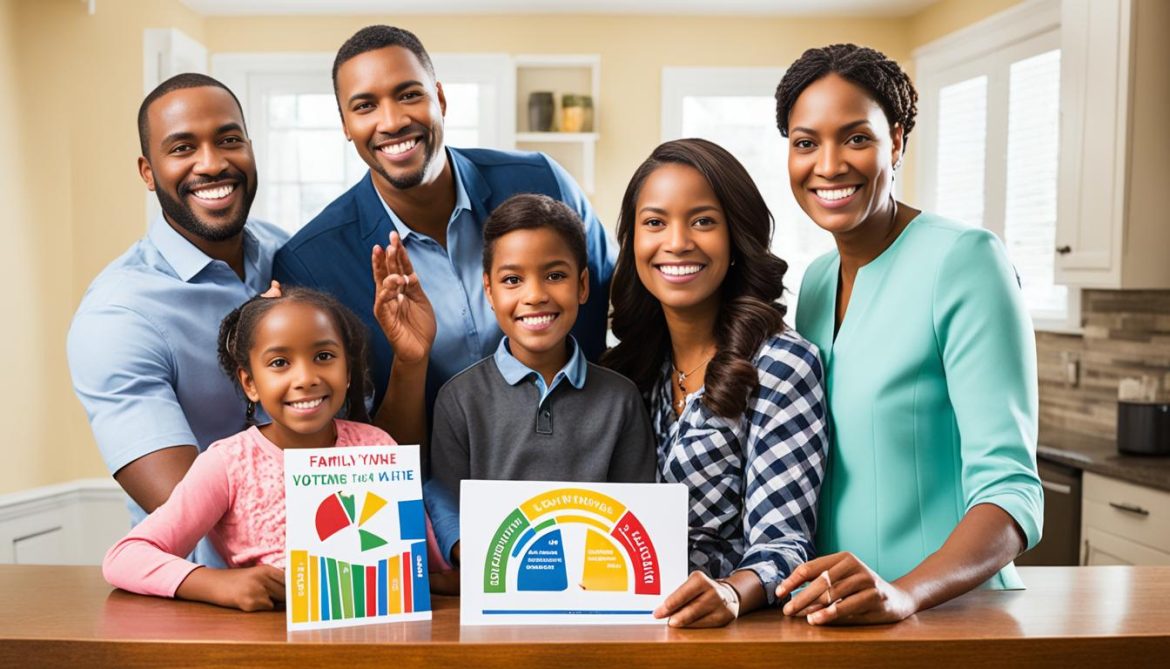Voting is a fundamental right and a cornerstone of democracy in the United States. It empowers individuals to have a say in the decisions that shape their communities, their lives, and the future of the nation. By exercising your right to vote, you contribute to the collective voice of the people and play an active role in shaping the policies and priorities of your government.
So, why is it important to vote? Here are the key reasons:
Key Takeaways:
- Voting allows you to prioritize your values and issues that matter to you.
- By participating in elections, you choose representatives who align with your beliefs.
- Voting influences the allocation of government funding and resources.
- Increased voter participation leads to stronger voices for important issues.
- Every vote counts, and you can have a significant impact on election outcomes.
These key takeaways emphasize the importance of voting in democratic societies. Your vote matters, and it gives you the power to shape the future. So, exercise your right to vote and make your voice heard in the democratic process!
Elections Impact Your Everyday Life and Family
Voting is not only a civic duty but also a powerful way to shape the policies and decisions that impact your everyday life and family. By exercising your right to vote, you play a crucial role in determining the future of your community and country.
When you vote, you contribute to the functioning of democracy, ensuring that the principles of voting and democracy are upheld. By participating in elections, you exercise your voting rights and help safeguard the democratic process for future generations.
Through your vote, you have the opportunity to influence various aspects of everyday life, such as education, infrastructure, healthcare, job security, pay equity, crime prevention, gun safety, and immigration policies. Elected officials at the local, state, and federal levels make decisions that directly affect the resources and services available to your community.
For example, your vote can impact the allocation of education funding, determining the quality and accessibility of schools for your children. It can influence the development of infrastructure projects that improve transportation and create job opportunities in your area. Your vote can shape healthcare policies, ensuring access to quality and affordable care for you and your loved ones.
Additionally, your vote has the power to influence decisions related to job security and fair wages, promoting an equitable and inclusive economy. It can impact crime prevention initiatives and gun safety regulations, making your neighborhood safer. Your vote also has the potential to shape immigration policies, protecting the rights and opportunities of diverse communities.
By participating in the democratic process, you can ensure that your needs are represented and your voice is heard in the policy-making process. Every vote counts and can have a significant impact on the outcomes of elections, shaping the future of your community and country.
So, when Election Day arrives, remember the importance of your civic duty to vote. Exercise your voting rights and make your voice heard. Your vote has the power to create positive change and impact the everyday lives of you and your family.
The Impact of Voting
When you vote:
- You support the principles of voting and democracy.
- You contribute to the functioning of democracy.
- You exercise your voting rights.
- You safeguard the democratic process.
- You influence education funding and accessibility.
- You shape infrastructure development and job opportunities.
- You impact healthcare policies and access to care.
- You influence job security and fair wages.
- You shape crime prevention and gun safety regulations.
- You impact immigration policies and diverse communities.
“Voting is the most powerful nonviolent tool we have in a democratic society.” – John Lewis
Every Vote Counts
Asian Americans and Pacific Islanders have emerged as a significant voting bloc in recent years. With their growing voting power, these communities can have a remarkable impact on election outcomes and shape the representation of their interests in government.
In many elections, the margin of victory can be determined by just a few votes. This highlights the crucial role of every individual’s voter participation. By exercising your right to vote, you hold the power to influence election results and contribute to the democratic process.
Voting is not just a civic duty; it is an opportunity to make your voice heard and support candidates who align with your values and priorities. By actively participating in elections, you can ensure that your interests and concerns are represented by the officials who hold decision-making power.
Impact of Voting
Voting has a profound impact on the policies and decisions made at local, state, and federal levels of government. It allows you to influence issues that directly affect your everyday life, such as healthcare, education, infrastructure, and more. By casting your vote, you contribute to the allocation of government funding and resources that shape the welfare of your community.
“The vote is the most powerful instrument ever devised by man for breaking down injustice and destroying the terrible walls which imprison men because they are different from other men.” – Lyndon B. Johnson
Every vote counts because it contributes to the collective power of the electorate. Each ballot cast strengthens the democratic process and ensures that representative democracy remains a cornerstone of our society.
Unlocking Your Voting Power
To realize the full potential of your voting power, it is essential to stay informed about the candidates and issues at stake in each election. Engage in research, attend candidate forums, and explore different viewpoints before making an informed decision on the ballot.
Remember, your vote is an expression of your values and hopes for the future. It is an opportunity to actively participate in shaping the society you want to live in. Make your voice heard through the democratic process and let your vote count.
| Election | Voter Turnout |
|---|---|
| 2008 Presidential Election | 61.6% |
| 2012 Presidential Election | 58.6% |
| 2016 Presidential Election | 60.1% |
| 2020 Presidential Election | 66.7% |
The table above demonstrates the varying levels of voter turnout in recent presidential elections. While voter participation has seen some fluctuations, it underscores the importance of mobilizing voters to exercise their right to vote and have a say in the democratic process.
Decide Where Your Tax Dollars Go
Voting is not only a civic duty but also a powerful way for individuals to have a say in how their tax dollars are allocated and who governs their communities. By actively participating in elections and electing officials at various levels of government, voters can determine funding priorities and support projects that align with their needs and values. This ensures that those who contribute to the tax system have a voice in how their money is spent.
When you exercise your voting power, you can influence the direction of government funding and resources. By electing representatives who prioritize issues that matter to you, such as education, healthcare, infrastructure, or environmental protection, you can help shape the allocation of tax dollars towards these areas. Your vote becomes a tool for advocating for the causes and initiatives that you believe will benefit your community.
Moreover, voting allows you to support candidates who are committed to responsible financial management and transparency. By electing officials who prioritize accountability and fiscal responsibility, you can ensure that tax dollars are used efficiently and effectively to serve the needs of the community.
Examples of How Your Tax Dollars Can Be Allocated
| Allocation | Description |
|---|---|
| Education | Investing in schools, teachers, and educational programs to provide quality education for all. |
| Infrastructure | Improving roads, bridges, public transportation, and other public facilities to support economic growth and enhance the quality of life. |
| Healthcare | Expanding access to affordable healthcare, improving facilities, and investing in public health initiatives. |
| Environmental Protection | Supporting initiatives to combat climate change, preserve natural resources, and promote sustainable practices. |
| Social Services | Funding programs that address poverty, homelessness, and other social issues to support vulnerable populations. |
By exercising your right to vote, you can play an active role in deciding where your tax dollars go. It is an opportunity to have a direct impact on the issues that matter most to you and contribute to the overall well-being of your community. Your vote matters, and it is essential to fulfill your civic duty and make informed decisions when casting your ballot.
Fight Against Racism and Discrimination
Voting is a powerful tool for combating racism, discrimination, and hate crimes. By participating in the democratic process, you can make your concerns heard and hold elected officials accountable for addressing issues of social justice and equality. Voting empowers communities to work towards a more inclusive and safe society.
Empowering Communities
When you exercise your civic duty to vote, you contribute to the fight against racism and discrimination. By supporting candidates who prioritize equality and social justice, you help shape policies that foster a more inclusive society. Your vote sends a clear message that discrimination will not be tolerated, and elected officials must take action to create a fair and equitable society for all.
Making Your Voice Heard
Voting gives you a platform to express your values and concerns. It allows you to support candidates and initiatives that promote diversity, challenge systemic racism, and work towards racial equity. Through the power of your vote, you can ensure that elected officials are committed to fighting against discrimination and creating a society that respects and values every individual.
“Our lives begin to end the day we become silent about things that matter.” – Martin Luther King Jr.
Dr. Martin Luther King Jr.’s words remind us of the importance of using our voices to fight against racism and discrimination. Voting is a key way to make sure that your voice is heard and to promote the values of equality and justice that Dr. King dedicated his life to.
Building Stronger Communities
Voting not only helps combat racism and discrimination on an individual level, but it also plays a crucial role in building stronger communities. By electing representatives who are committed to racial equality and justice, communities can work together to address systemic issues. Through civic engagement and voter participation, we can create a society that embraces diversity and actively works towards eliminating racism and discrimination.
| Voting Right | Description |
|---|---|
| Universal Suffrage | The right to vote is granted to all adult citizens, regardless of race, gender, or ethnicity. |
| Non-discrimination | Voters cannot be denied the right to vote based on their race, color, or previous condition of servitude. |
| Language Support | Certain jurisdictions provide language assistance for non-English speaking voters. |
| Accessible Voting | Measures are in place to make voting accessible for individuals with disabilities. |
Protect Our Voting Rights
The right to vote is fundamental to a functioning democracy. It is the cornerstone of citizen participation, giving individuals the power to shape their communities and determine the course of their country. However, voting rights are not always guaranteed, and efforts to restrict or suppress the right to vote continue to be a concern.
In recent years, strict laws and redistricting practices have been used to undermine voting rights. These measures disproportionately affect marginalized communities, including people of color, low-income individuals, and young people, making it more challenging for them to exercise their right to vote.
Now more than ever, it is crucial for individuals to actively protect and advocate for voting rights. By staying informed, engaging in the political process, and supporting candidates who champion voting rights, you can help safeguard your own voting rights and the rights of others.
Advocacy is a powerful tool in the fight to protect voting rights. Engage with organizations dedicated to preserving and expanding voter access, educate others on the importance of voting, and raise awareness about the impact of voting on democracy.
It is also essential to stay informed about changes in voting laws and actively oppose barriers to voter participation. By challenging restrictive legislation and redistricting efforts, you can help ensure that everyone’s voice is heard and counted.
“The vote is the most powerful instrument ever devised by man for breaking down injustice and destroying the terrible walls which imprison men because they are different from other men.” – Lyndon B. Johnson
Summary of Ways to Protect Voting Rights:
- Support candidates who advocate for voting rights.
- Engage with organizations dedicated to preserving and expanding voter access.
- Educate others about the importance of voting and its impact on democracy.
- Stay informed about changes in voting laws and actively oppose barriers to voter participation.
- Challenge restrictive legislation and redistricting efforts.
Protecting voting rights is essential for a fair and inclusive democratic process. By actively participating in the fight to safeguard voting rights, you can help ensure that every eligible citizen has an equal opportunity to voice their opinions and shape the future of their communities and their nation.
| Impact of Protecting Voting Rights | Voter Participation |
|---|---|
| Preserves and strengthens the democratic process | Increases engagement and representation |
| Protects the voices of marginalized communities | Ensures diverse perspectives are included |
| Prevents unjust barriers to voting | Promotes fair and accessible elections |
Fastest Growing Population
The Asian American and Pacific Islander (AAPI) community in the United States has witnessed rapid growth and emerged as one of the fastest-growing racial and ethnic groups. This demographic shift carries significant implications in shaping and influencing elections across the country.
With their increasing population and voting power, Asian Americans and Pacific Islanders have the ability to make a substantial impact on electoral outcomes and policy decisions.
The rise of the Asian American and Pacific Islander population represents a growing force in American politics, as their numbers continue to increase. This demographic shift highlights the importance of recognizing and addressing the specific concerns, needs, and aspirations of these communities.
By actively participating in the electoral process, Asian Americans and Pacific Islanders can advocate for their interests and ensure their voices are heard. This not only enables them to have a say in the policies that affect their lives but also contributes to a more inclusive and representative democracy.
We Shape Elections
The Asian American and Pacific Islander (AAPI) electorate plays a pivotal role in shaping and influencing elections at all levels of government. By actively participating in the electoral process, the AAPI community ensures that their voices are heard and their interests are represented. AAPI representation in politics is crucial for fostering a diverse and inclusive democracy.
The AAPI community’s growing population and increasing voter participation have positioned them as a significant voting bloc in recent years. With their collective voting power, Asian Americans and Pacific Islanders have the ability to sway electoral outcomes and influence policy decisions that directly impact their communities.
Having AAPI representation in elected positions is essential for the accurate and comprehensive representation of the diverse perspectives and experiences within the AAPI community. When AAPI individuals hold public office, they bring firsthand knowledge of the unique challenges and opportunities faced by their communities, ensuring that policies and legislation effectively address their needs.
“The AAPI community’s engagement in elections ensures that their interests are not only considered but also prioritized.”
Moreover, AAPI representation in politics helps break down stereotypes, challenge biases, and promote greater cultural understanding among elected officials and the broader public. It fosters a more inclusive political landscape where diversity of thought and representation are valued.
Increasing AAPI Representation in Politics
- Encourage AAPI individuals to run for elected positions and provide support and resources to help them navigate the political landscape.
- Advocate for fair redistricting practices that do not dilute the voting power of AAPI communities.
- Support organizations that work to uplift and amplify AAPI voices in politics, such as the Asian American Legal Defense and Education Fund (AALDEF) and Asian and Pacific Islander American Vote (APIAVote).
- Engage in voter education initiatives that empower the AAPI electorate to make informed decisions at the polls.
By actively participating in the electoral process and advocating for greater AAPI representation in politics, the AAPI community has the power to shape elections and work towards a more inclusive and representative democracy.

Conclusion
Voting is not just a right, but a powerful tool that shapes the very fabric of our democracy. It provides individuals with the opportunity to make a difference, influence policy decisions, and hold elected officials accountable. By exercising your right to vote, you become an active participant in the democratic process, playing a crucial role in shaping the future of your community and nation.
One of the key benefits of voting is the ability to create positive change. Your vote has the power to address the issues that are important to you and shape the direction of your community. Whether it’s advocating for better education, healthcare, or job opportunities, voting enables you to prioritize your values and take steps towards building a better future.
Furthermore, voting is a crucial step in ensuring that the voices of all individuals are heard. It is a way to promote inclusivity and equality, allowing for diverse perspectives to be represented in policy-making decisions. When you vote, you contribute to a democracy that values and respects the rights and interests of every citizen, fostering a society that is more just and fair for all.
By recognizing the importance of voting and actively participating in the electoral process, you become an agent of change. Your vote is not just a single drop in the ocean but a ripple that can create a wave of impact. Together, we can shape the course of our communities, influence national priorities, and build a better future for ourselves, our families, and future generations. Remember, every vote counts and your voice matters.
FAQ
Why is voting important?
Voting is important because it gives individuals the power to create positive change in their communities and improve their quality of life. It allows people to prioritize their shared values and issues, choose representatives that align with their beliefs, and influence the allocation of government funding and resources.
How does voting impact everyday life?
Voting directly impacts various aspects of everyday life, such as education, infrastructure, healthcare, job security, pay equity, crime prevention, gun safety, and immigration policies. The decisions made by elected officials at the local, state, and federal levels of government affect the resources and services available to communities. By voting, individuals can ensure that their needs are represented and their voices are heard in the policy-making process.
Does every vote count?
Yes, every vote counts. In many elections, the margin of victory can be determined by just a few votes. By exercising their right to vote, individuals can have a significant impact on election outcomes and influence the representation of their interests in government.
How does voting influence the allocation of tax dollars?
Voting allows individuals to have a say in how their tax dollars are allocated and who governs their communities. By electing officials at various levels of government, voters can determine funding priorities and support projects that align with their needs and values. It ensures that those who contribute to the tax system have a voice in how their money is spent.
How does voting fight against racism and discrimination?
Voting is a powerful tool for combating racism, discrimination, and hate crimes. By participating in the democratic process, individuals can make their concerns heard and hold elected officials accountable for addressing issues of social justice and equality. Voting empowers communities to work towards a more inclusive and safe society.
How can we protect our voting rights?
The right to vote is essential to a functioning democracy. However, there are ongoing efforts to restrict voting rights through strict laws and redistricting practices. By voting for candidates who support voting rights and advocating against restrictions, individuals can protect their own voting rights and the rights of others. Voting is crucial in preserving and strengthening the democratic process.
How does the growing Asian American and Pacific Islander population impact elections?
Asian Americans and Pacific Islanders have emerged as one of the fastest-growing racial or ethnic groups in the United States. This growing population has the potential to shape and influence elections throughout the country. By harnessing their voting power, Asian Americans and Pacific Islanders can have a significant impact on electoral outcomes and policy decisions.
How does the AAPI community shape elections?
The Asian American and Pacific Islander (AAPI) electorate has the power to shape and influence elections at all levels. By actively participating in the electoral process, the AAPI community can ensure that their voices are heard and their interests are represented. AAPI representation in politics is crucial for a diverse and inclusive democracy.
Why should everyone recognize the importance of voting?
Voting is a cornerstone of a thriving democracy and a fundamental civic right. It empowers individuals to create positive change, influence policy decisions, and hold elected officials accountable. By exercising their right to vote, individuals can shape the future of their communities and actively participate in the democratic process. It is essential for everyone to recognize the importance of voting and actively engage in the electoral process.







